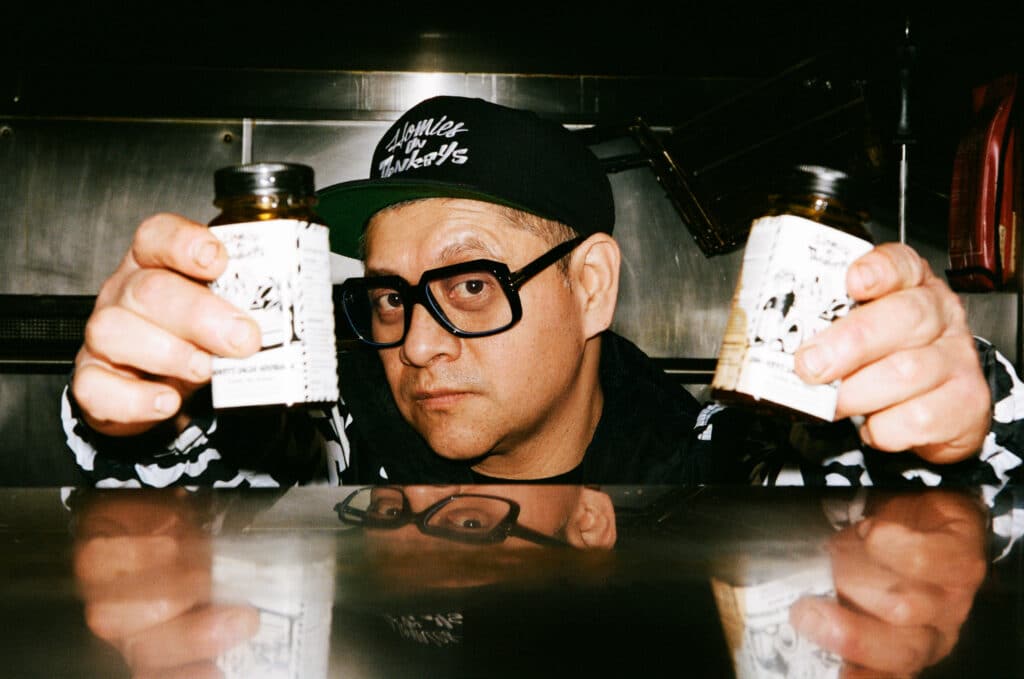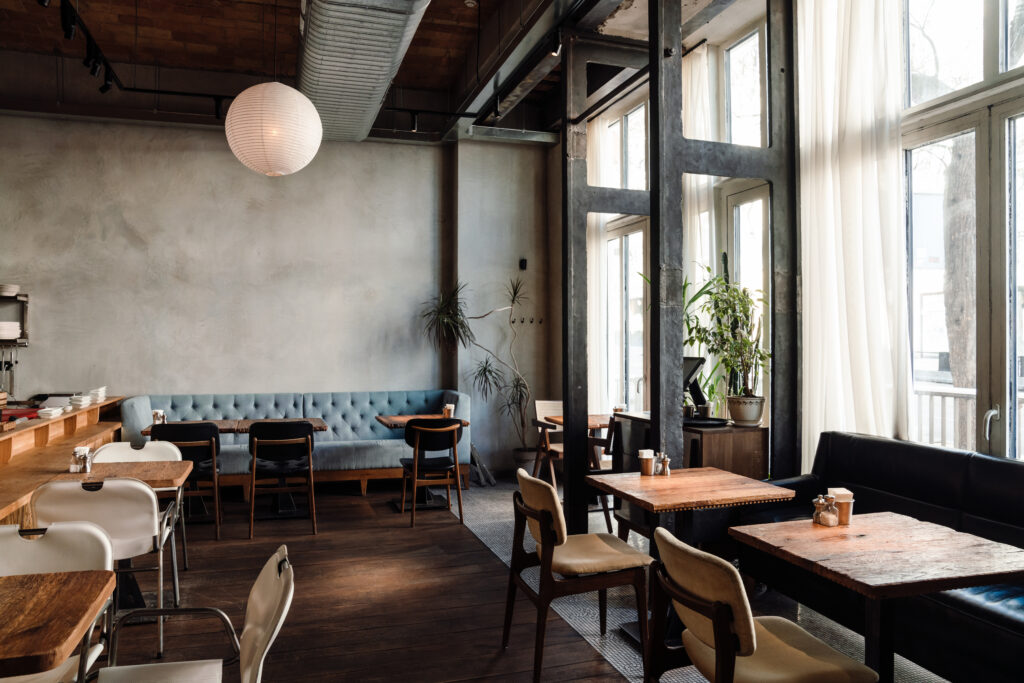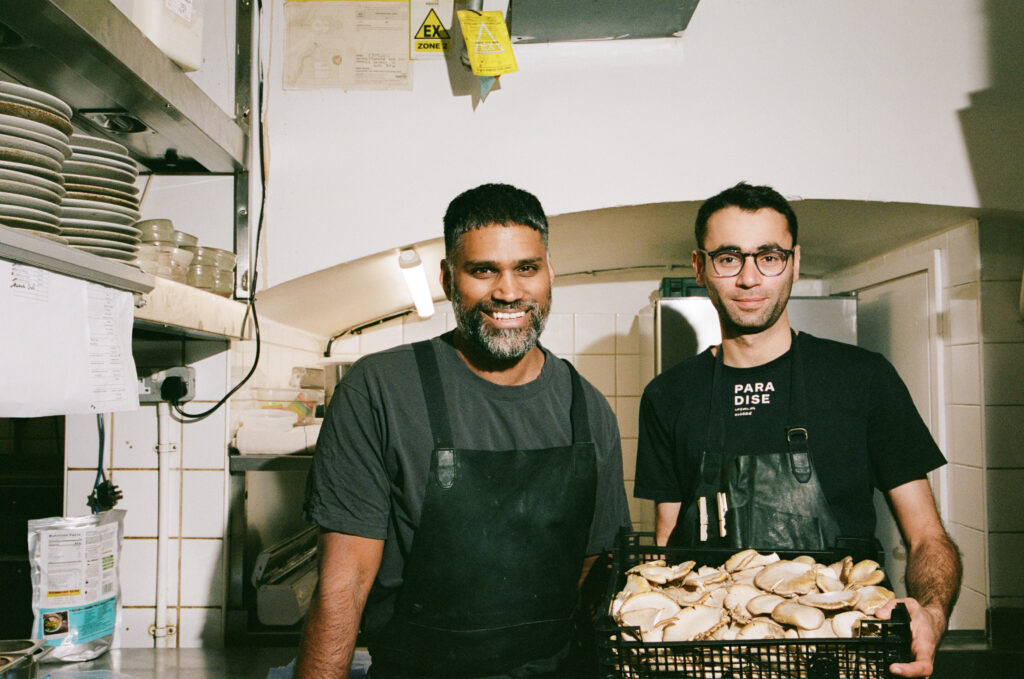Since opening their small stall in Wood Street Market in 2017, Chef Smokey and his partner, Sandra, have come a long way. From a humble 8-seater stall in Walthamstow to winning the BBC’s “Britain’s Top Takeaway: Mexican Edition” and opening a fully fledged space in Leytonstone, Homies on Donkeys has become a staple of East London’s culinary scene.
On an early Tuesday morning, I make my way to Leytonstone. The high street is still quiet. I arrive in front of a building that bursts with neon pinks, purples, and azures — its abstract geometric lines providing a sharp contrast to the drab retail spaces on either side. The mural is more than decoration; it’s a physical embodiment of Homie’s bold, 90s hip-hop-infused energy. I snuck in under the half-lowered shutter. The door behind it is unlocked. I push it open and call out, “Chef Smokey?”. The interior is drenched in colour, just like the outside. Smokey emerges from the kitchen, I introduce myself, he offers me a coffee, and we start talking. Usually, these interviews begin with photography in the kitchen before the conversation. But it’s just the two of us, and the conversation starts naturally. Sitting in one of the booths near the kitchen, we get into the thick of it before I even think to press record.
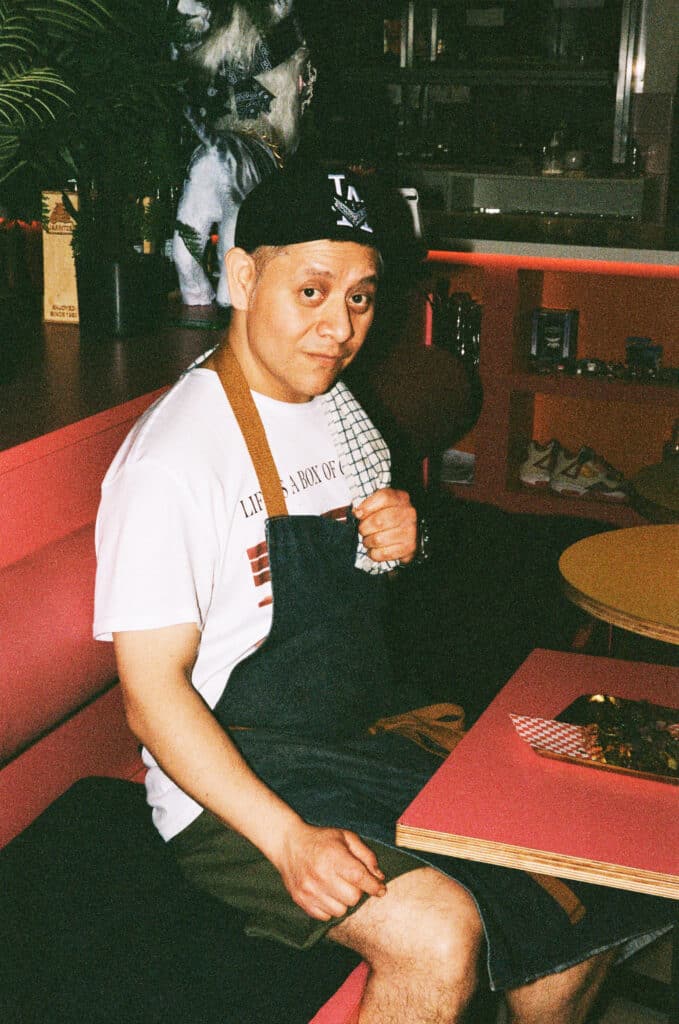
T: How did you first get into the kitchen?
S: I started cooking when I was a teenager. Growing up in a Mexican household, my parents always worked. So, I had to learn to cook at a very early age just to feed myself.
And then at the age of 15, a friend and I started a little burger stand in the street, mainly just to make some money, but it was mainly to have fun.
I did all the things, music, art, and then eventually, as many artists will know, I had to get more of a job because art sometimes doesn’t pay the bills. So, I went back to the kitchen, and I’ve been cooking for about, I would say, over 20 years in different places. And I discovered that through cooking, I learned all the things that I was interested in, mainly science. I found the perfect medium to merge all my interests: philosophy, history, art, and science. That’s what drives my cooking philosophy.
I’ve been in London for about 20 years now, that’s where I became a professional chef.
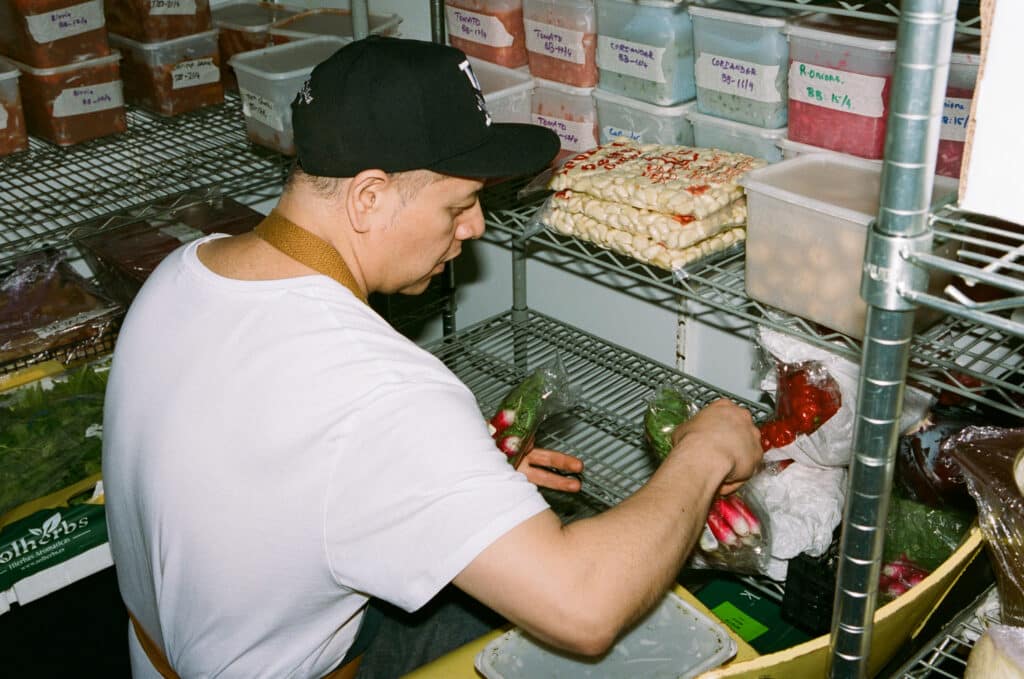
T: How has it been for you, moving from a small stall in Walthamstow to a big restaurant for the last 2 years?
S: We had Homies on Donkeys in Wood Street market for about six years, and how we started, it was an idea we always had, my partner Sandra and I: Cooking mainly and especially the food that we like in an environment that feels like we could be cooking for friends. While working in different restaurants, I always tried to sneak in Mexican recipes disguised as other dishes.
One day we decided to make a batch of Mexican salsas that we were going to sell in Hackney at a jumble sale. This is like a thing they do where people take stuff to sell outside of their flats, and we decided to name it after our idea, Homies on Donkeys. We made like 50 jars of salsa, and it sold out really quickly, and we felt this could be something else. Shortly after, I quit my job and started looking for a location for a small taqueria. That’s what we found at this location in Wood Street Market, and it was a place with six seats inside the place; we built eight more outside. It became really popular to the point where, like we used to have queues out of the door, great reviews and a lot of blogs and we were in the press. We entered a taco competition in 2019, as the underdogs, you know, against big restaurants with budgets and a lot of chefs. We showed up with two laundry bags and a few pots and pans, not really expecting anything, but we ended up winning. That set a chain of events that, you know, led us to be on the BBC and win another show. Entering different taco competitions and winning prizes and getting a little press to the point where we were really struggling for space in Wood Street, and we decided to upgrade to finally have a full-fledged restaurant. which is this place in Leytonstone.
Smokey and I head downstairs from the restaurant, away from the graffiti-covered walls, some of which he did himself, and into the cellar. Across a low-ceilinged room, hunching slightly, we make it to the walk-in fridge. The space is covered, floor to ceiling, in well-organised containers, labelled with ingredients already prepped or to be prepared, “all the produce is from All Greens,” Smokey mentions.
T: Over the last 20 years, the restaurant scene in London has completely exploded. How has it been for you, bringing the recipes that you like to it?
S: I would say that out of the people that I know, colleagues of mine, as in Mexican chefs that cook in London, I am one of the very few that remember when there was nothing.
You couldn’t even get a can of chipotles 20 years ago. The Mexican offering was always an exoticised Mexican idea; restaurants like “Chiquitos” will sell like chicken fajitas and burritos, and that was like the only offering.
And then the first Mexican wave arrived around 2008 when a lot of people who had travelled to the States brought the idea of having burritos and tacos, and although it was okay, it offered an idea of Mexican cooking, it was not what real Mexican chefs were doing. It was an idea that they brought over from America, and they imported their idea of Mexican food to the UK. And I think that’s around the time when I finally started seeing Mexican chefs trying to open Mexican restaurants where food was made by Mexicans, because that was another thing, there were no Mexican chefs, every Mexican restaurant didn’t have Mexican chefs. They had Brazilians, Spaniards, Portuguese, Italians, trying to cook a food they didn’t know or understand. So, it was up to the point when we had Mexican chefs coming to London and trying to open Mexican restaurants, operated by Mexicans. That’s what I would say was the second wave of Mexican cooking in London.
And what I see now it’s the third wave, obviously, a lot more Mexican chefs operating their own businesses, but also a lot more non-Mexican chefs trying their hands at Mexican cooking. In some cases, helping to popularise Mexican cooking and in a lot of cases, with a lot of knowledge and research and respect, and in a lot of cases, just trying to monetise and commodify Mexican cuisine and Mexican cooking because it’s very popular. That’s how I’ve seen the change in the last 20 years.
T: Before we started recording, you were talking about how you have issues with people fetishising the word authentic when it comes to cooking. Do you want to expand on that?
S: Absolutely. So, I think I see it especially with Mexican food than with other cuisines. I believe we romanticise the idea of “ethnic” cooking or “exotic” cooking, and the idea that for something to be authentic. I’ll give an example: our name is Homies on Donkeys, and it’s not Café Lupita or Café Jose Perez. From the get-go, we tried not to comply with what people would expect us to be at a Mexican restaurant. We don’t have Frida Kahlo on the wall, we don’t have mariachis or cactuses or sombreros. But what we do is we have a lot of knowledge about Mexican cuisine, gastronomy, history, and anthropology. About what Mexican cuisine and gastronomy are, and we apply that to the food, right?
For a lot of people, especially not Mexican people, they go to Mexico and they go to Oaxaca, they go to Mexico City and they just go to the same places and they see Mexican gastronomy through the eyes of a tourist and they get a romanticized idea that for something to be authentic and traditional, you have to have the picture of your grandma on the wall and, it has to be very rustic and very casual and mostly as cheap as you can because that’s what they feel makes it real.
Whereas that’s not the case. The case is our food, it could be sophisticated and it’s obviously delicious, but it could be elegant. It’s well crafted. We have a heritage as well, and we now, as modern Mexican chefs, also have a lot of modern techniques and knowledge and tools, which makes our food better. So we can take traditional ideas, traditional recipes, or modern techniques and make Mexican dishes as elegant as any other cuisine, you know, French, Italian, you name it, and we are looking for the same respect and validation, not only be not only be measured on how authentic, or how traditional you are, because that is stifling and holding us back from innovation and advancement and evolution.
While he’s chopping cauliflowers and radishes, I walk around the spotless stainless-steel kitchen, asking Smokey about what he’s preparing. He answers, and asks questions about my equipment, amused when I finish the first roll of film and the camera automatically rewinds. “God, I’ve not heard that sound in 20 years”, he says.
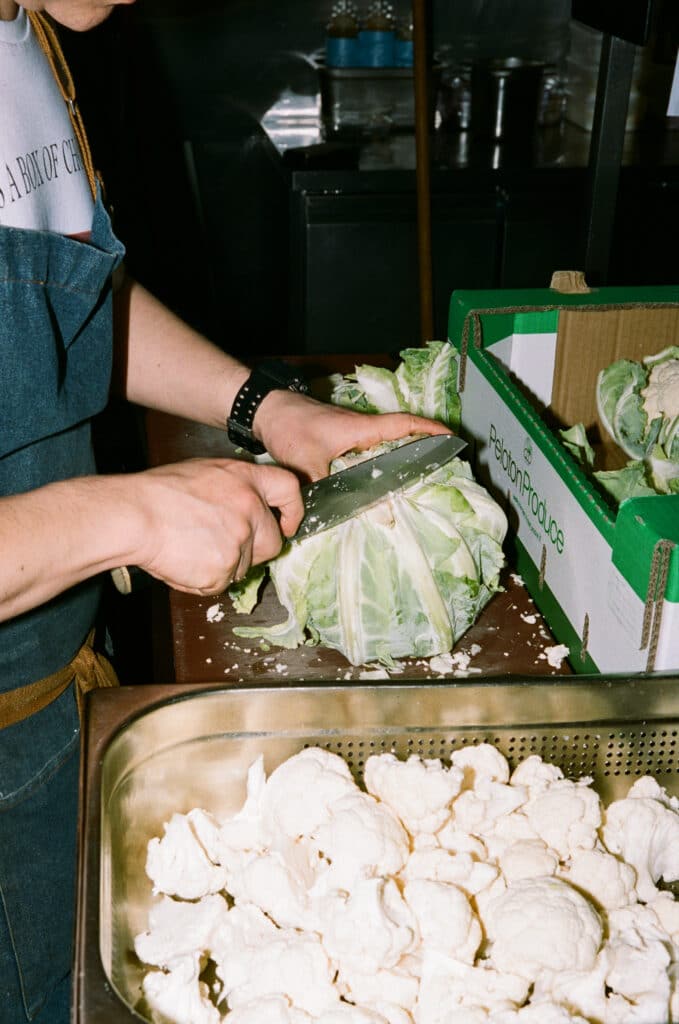
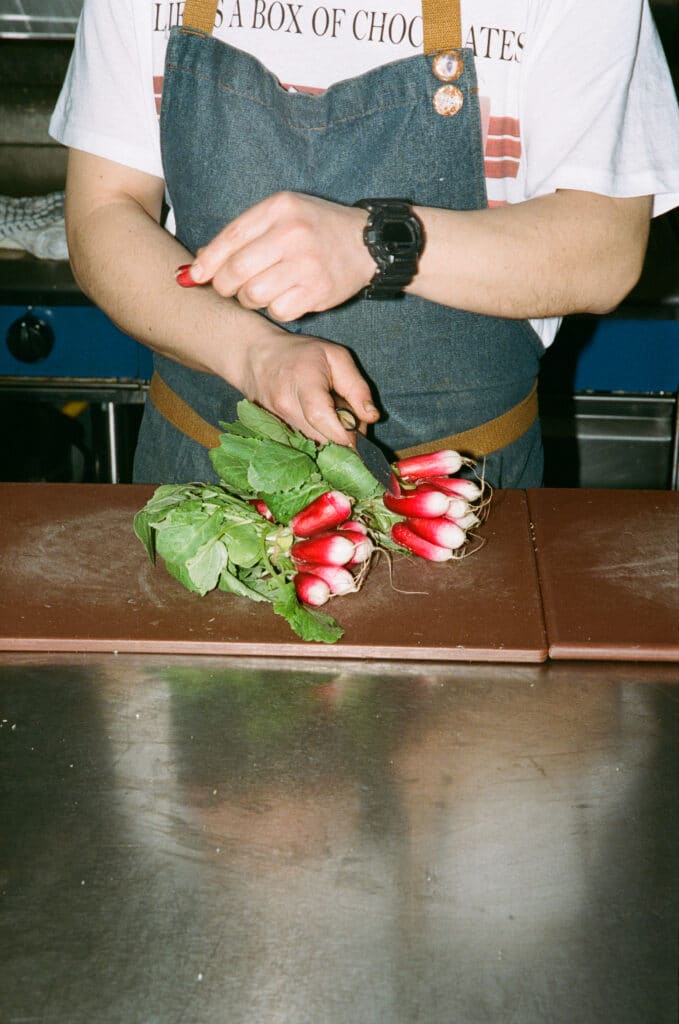
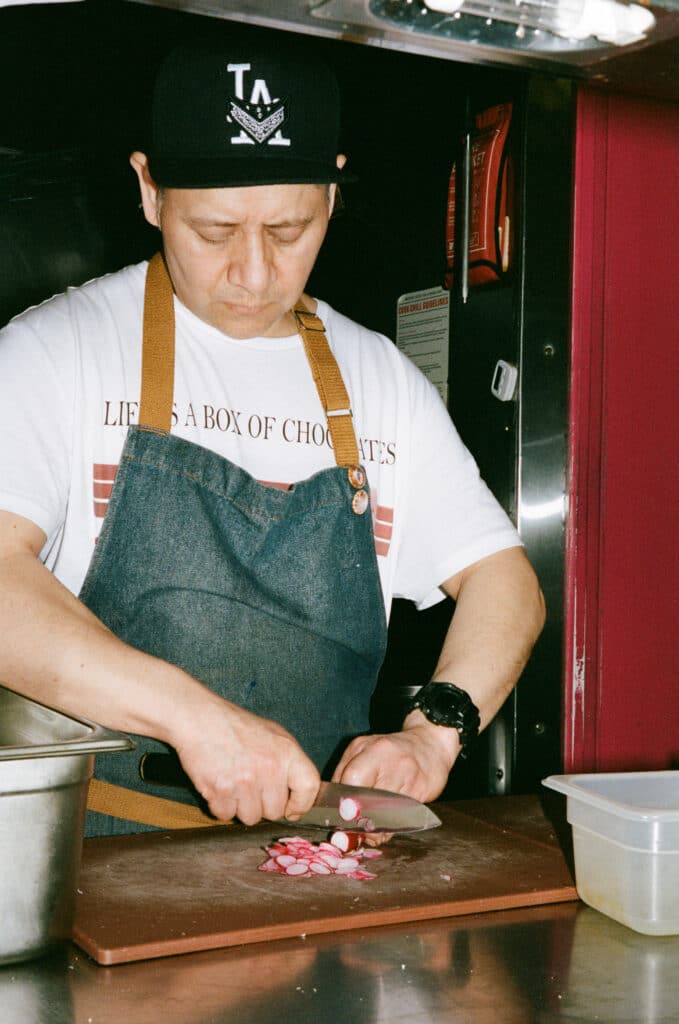
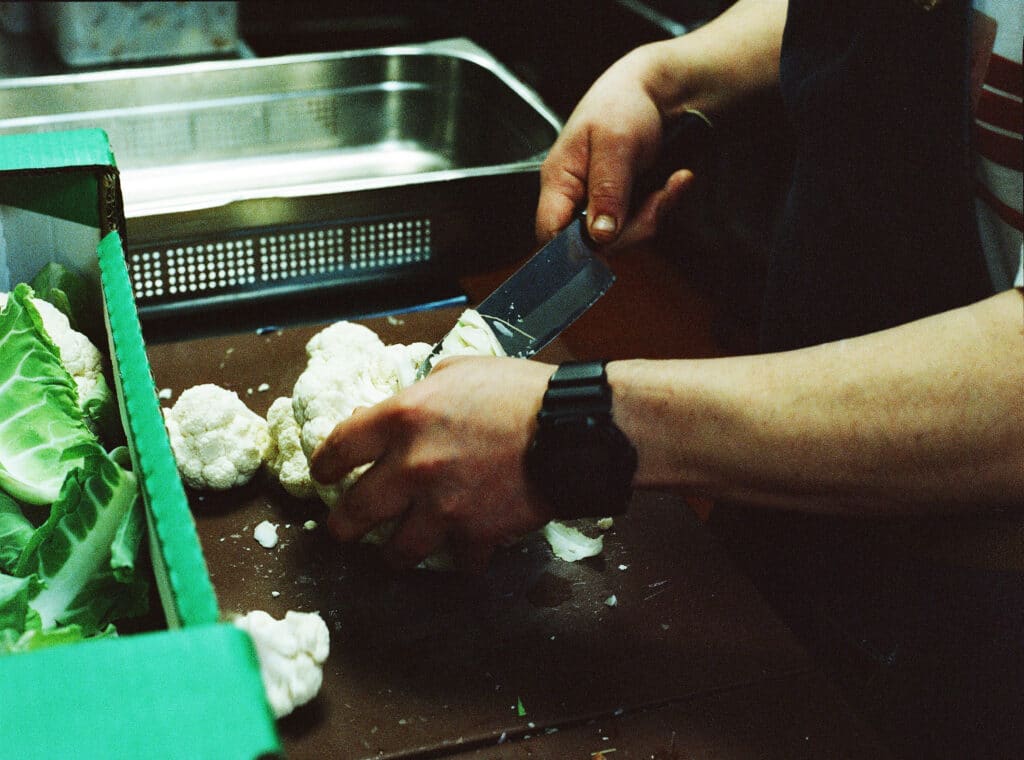
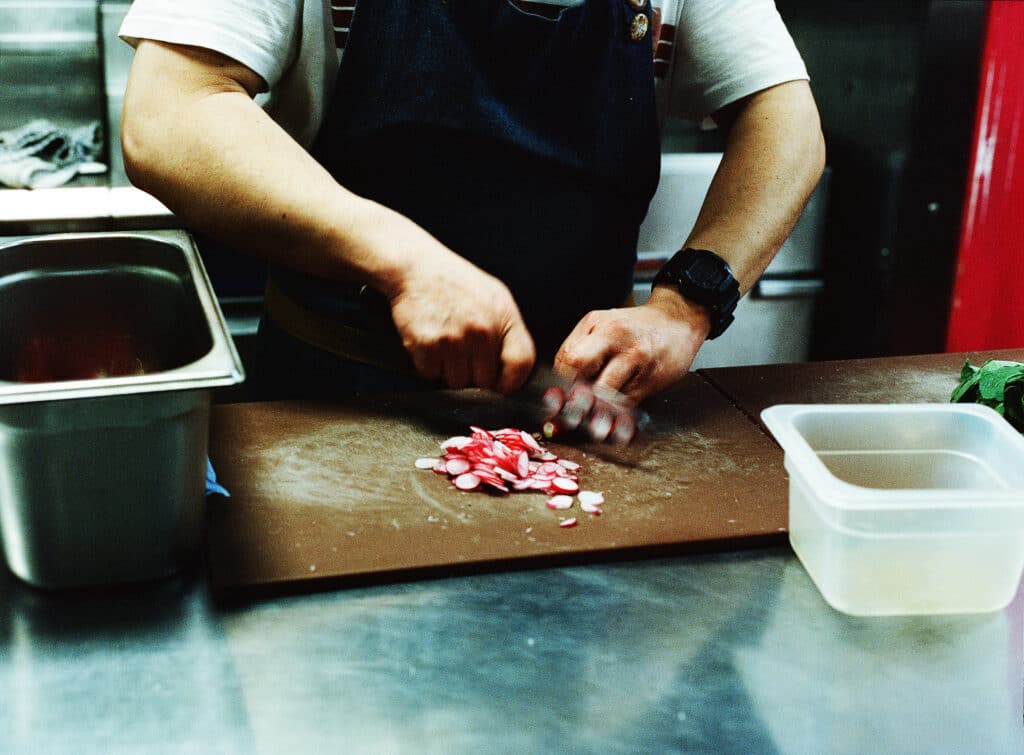
T: How would you say that your relationship with your greengrocers, All Greens, affects your creativity?
S: A lot of people would say, you measure how good a chef is when you see them cooking fish. I would say you measure how good a chef is by how they cook vegetables.
Because any competent chef can cook meat, like chicken, steak, braising beef, but to know vegetables, how to treat them, how many different types of vegetables, and how they can be cooked in different ways is a lot more complicated than cooking animal protein. That takes me to the idea of adaptability and sustainability. Knowing what’s in season, it’s adaptability, you adapt by buying something that might not be traditionally Mexican, but how can I treat celeriac? Transform it and put it into a Mexican context.
Can I make a taco out of celeriac? Or Brussels sprouts in winter, or Jerusalem artichokes? Those are not Mexican ingredients, but if I see them, I’ll buy them and I’ll try to cook them within a Mexican context. So, for me, having greengrocers that are not always trying to sell you the same thing, they themselves expand their ideas by having maybe ingredients I’ve never seen before, having access to that increases your knowledge.
And I would say it’s your gastronomic vocabulary. You discover something you’ve never seen before. You do your research and then you buy it and then you experiment with it and then finally you mix it into a dish, and now you have a new word, a new vocabulary, a new ingredient that you know how to cook and how to prepare and how to present it.
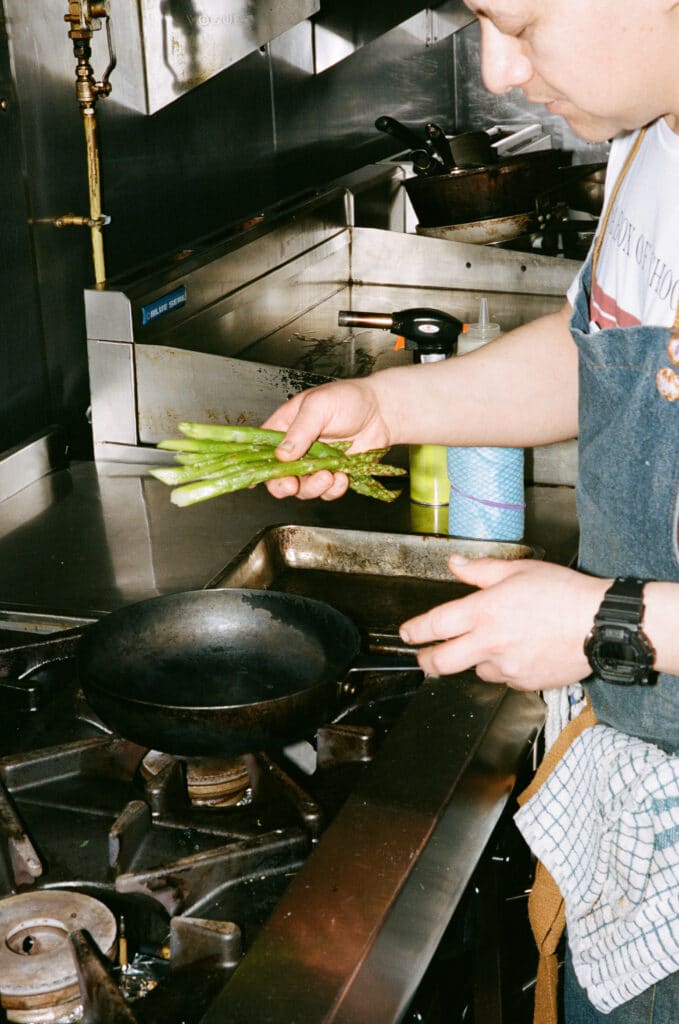
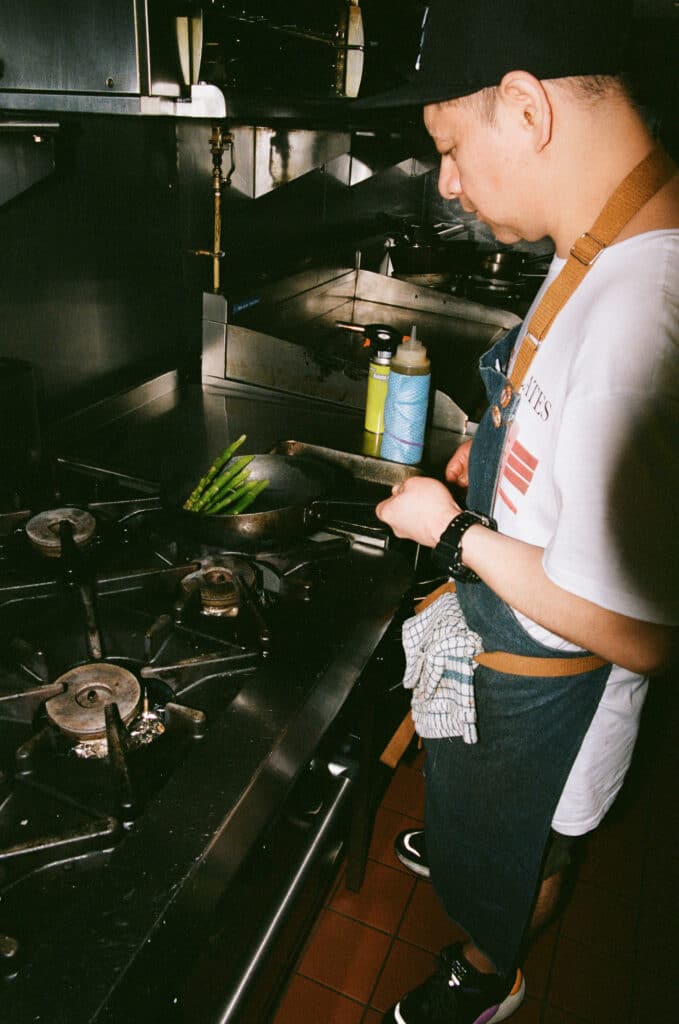
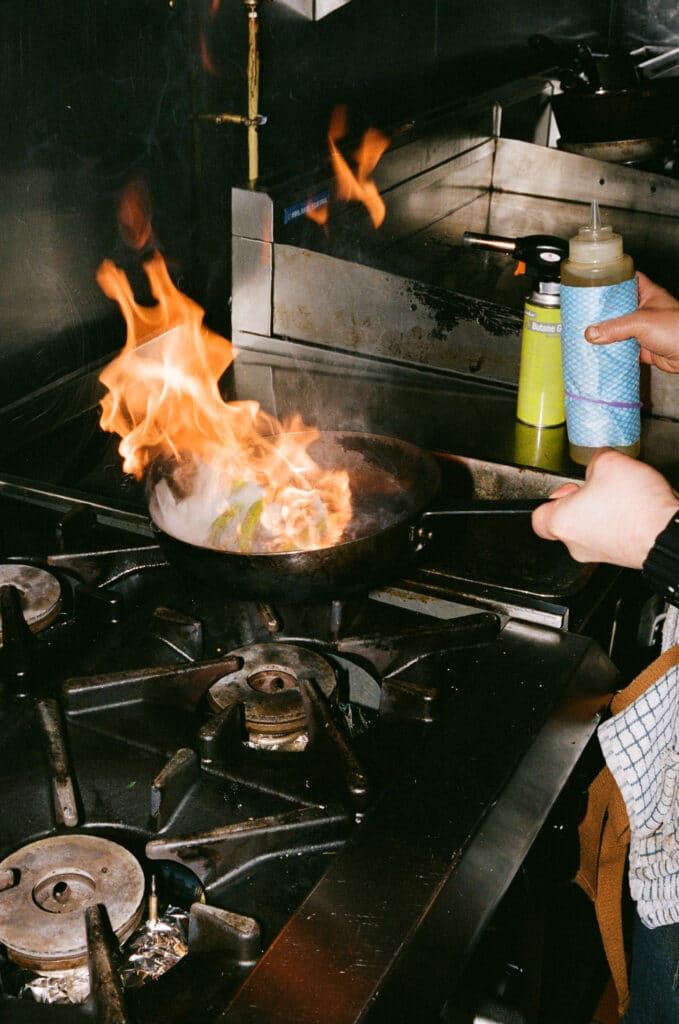
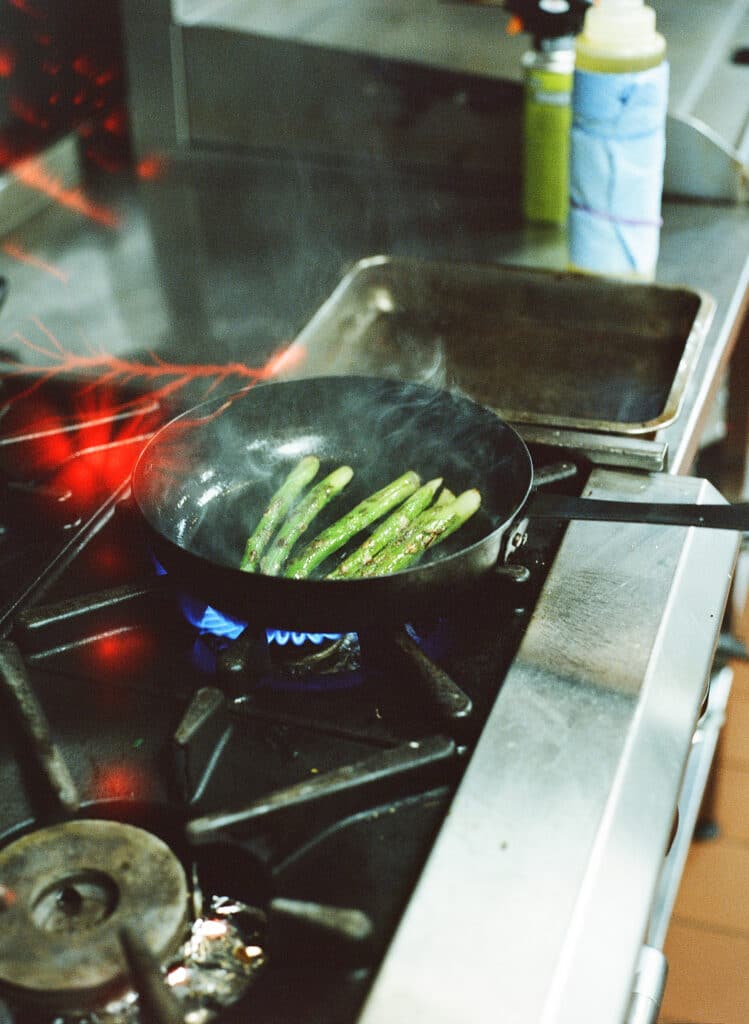
As soon as we finish the interview, Smokey is back into prep mode; he’s got deliveries coming in and more chopping to do, and he’s also got another interview that day with the platform Delli. He’s launching a Homies on Donkeys-branded jarred salsa adobada with them and must think of a recipe quickly to give to their social media manager. He then shows me the recipe he’s going to share with All Greens, an asparagus dish, and he gives me advice on how to best prepare and cook green vegetables to give them the best texture.
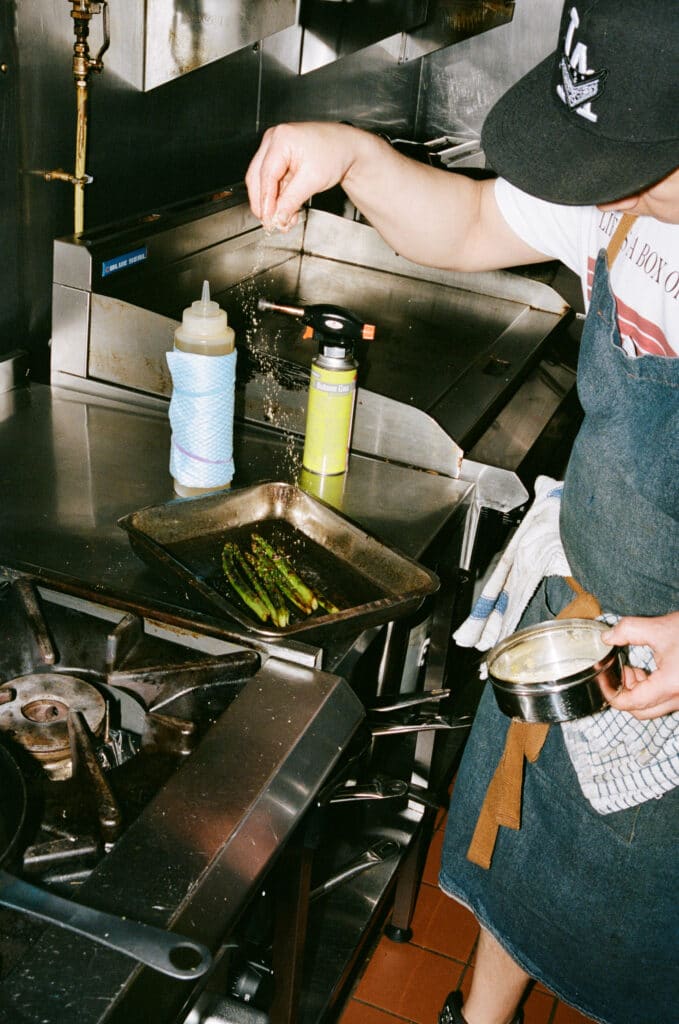
As we cross the kitchen, he’s in constant motion: doing the dishes, sharpening his knives, getting everything ready for service. It is barely noon when a member of the front-of-house team shows up. The restaurant phone starts ringing and doesn’t stop. Bookings come one after the other. I take my leave, stepping out of Smokey’s vivid, creative, vibrant world and back onto the high street — back into the quiet hum of ordinary London suburbia. I glance over my shoulder, just to be sure that bold flash of colour and energy is still there, and not just a mirage.
